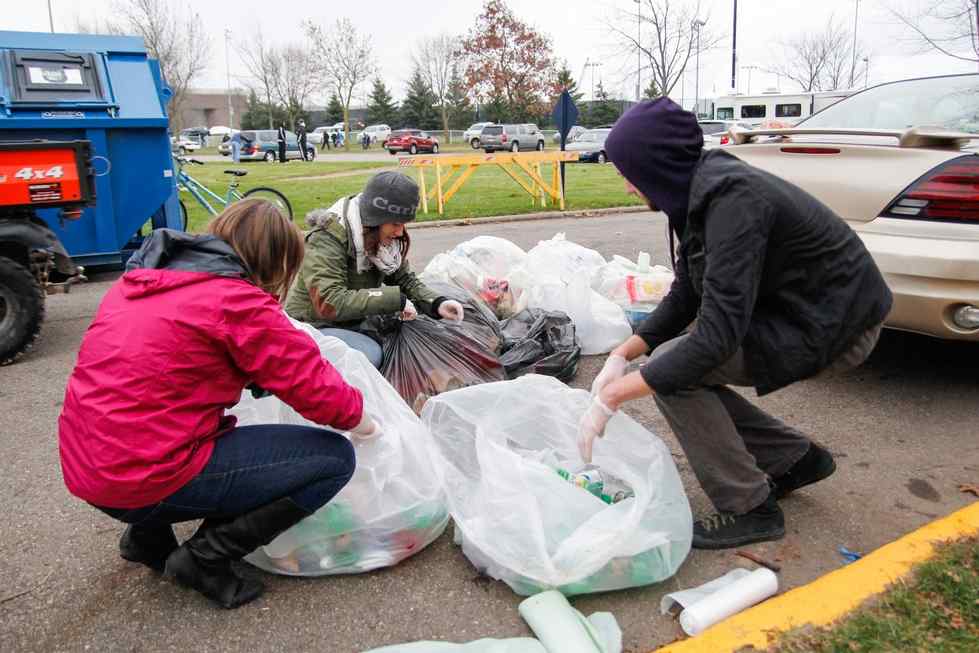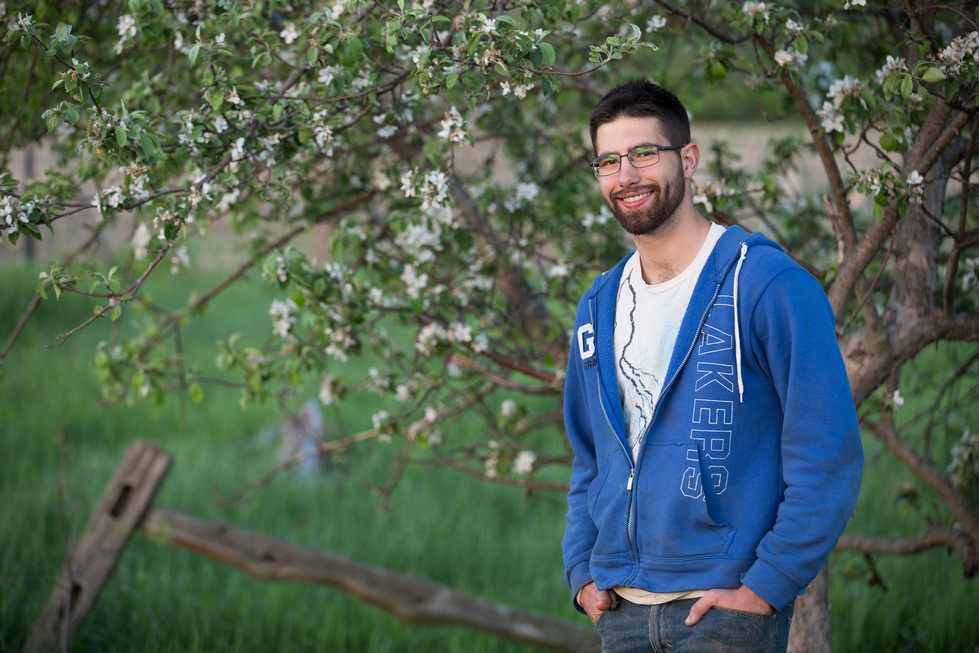Applying Sustainable Practices
Grand Valley Receives Recognition for Sustainability
National and statewide environmental organizations continue to recognize Grand Valley’s commitment to sustainability in all areas of campus life: academics, campus infrastructure, activities, and career preparation.
For the fifth year in a row, Grand Valley State University has been named one of the country’s most environmentally responsible colleges by “The Princeton Review.” The university is included in “The Princeton Review’s Guide to 332 Green Colleges: 2014 Edition,” released just prior to Earth Day on April 22, 2014. More than 830 schools were
surveyed to be in the guide.
In addition, Grand Valley received an award from Keep Michigan Beautiful for community development initiatives and projects in the area of sustainability. Keep Michigan Beautiful is an affiliate of the national organization, Keep America Beautiful, and annually recognizes programs and activities that contribute to environmental cleanup,
beautification, site restoration, and historical preservation.
The Sustainable Community Development Initiative (now the Office of Sustainability Practices) in Brooks College submitted the application for the award and detailed Grand Valley’s efforts in waste minimization, including waste audits, energy reduction competitions, the Eco-Rep Program, and the zero-waste football games.
Kimberly Schoetzow, graduate assistant for the Office of Sustainability Practices, said that last year, students composted nearly 30,000 pizza boxes and diverted nearly 60 percent of waste from the landfill at the homecoming football game.
GVSU Maintains AASHE STARS GOLD Rating
Grand Valley again became the only university in the state and one of 61 in the country to receive gold status after completing a sustainability assessment developed by the Association for the Advancement of Sustainability in Higher Education (AASHE).
The Sustainability Tracking, Assessment, and Rating System (STARS) is designed to gauge the progress of colleges and universities toward sustainability in all sectors, including education and research, operations, innovation and planning, and administration and engagement. Grand Valley joins gold STARS universities such as Cornell, Colorado State, and Stanford.
“A gold rating helps establish Grand Valley as a leader and community resource in dealing with complex issues where economic, environmental, and social welfare issues intersect,” said Anne Hiskes, dean of the Brooks College of Interdisciplinary Studies. “STARS reporting helps the campus community identify areas of strength and areas for future improvement.”
Of the 282 schools that currently hold a ranking nationwide,Grand Valley’s average score was higher than the national score. The self-reporting assessment included more than 900 questions.
This is the third time Grand Valley has participated in the program. The university received gold status in 2013, up from silver status in 2011. In 2008, Grand Valley was selected as one of 50 universities in the U.S. to participate in the pilot phase of the STARS rating system. The rating system includes bronze, silver, gold, and platinum statuses; to date, no institution has reached platinum status.
The full report can be viewed by searching “Grand Valley”at https://stars.aashe.org/.
Grand Valley Ranks High in National Recycling Competition
Grand Valley ranked first in the state and in the top 35 nationwide (for universities with more than 20,000 students) in the composting and waste minimization categories of the nationwide recycling contest RecycleMania.
After an eight-week competition to reduce waste and increase student awareness about the importance of recycling, Grand Valley ranked high among more than 460 colleges and universities.
Grand Valley took 34th place in the nation, up from 46th last year, in the waste minimization category, and took 29th place in the nation, up from 33rd last year, in the food service organics category. During the competition, more than 183,000 pounds were recycled and more than 295,000 pounds were composted. In total, nearly 479,000 pounds were diverted from the waste stream.
“Grand Valley has made sustainability one of our core values,” said Steve Leeser, operations supervisor for Facilities Services. “We have many faculty members, staff members, and students who are passionate about sustainability. As well as we have done in the past, we could easily increase our national ranking if everyone participated.”
Leeser said the university has invested in making attractive containers available all over campus to make recycling and composting convenient and easy. This is the sixth year Grand Valley has competed in RecycleMania. The Office of Sustainability Practices, Campus Dining, Housing, and Pew Campus Operations partnered with Facilities Services during the contest.

SAP Buzzing with Bees
A group of students built and installed a new apiary at Grand Valley’s Sustainable Agriculture Project (SAP) in late April.
The apiary will house two honeybee hives that were raised at the university’s first apiary on the Meijer Campus in Holland.
Anne Marie Fauvel, affiliate professor of Liberal Studies, and the GVSU Bee Keepers Club brought the apiary to Holland two years ago. She said bringing one to Allendale aligns with the objectives of the SAP.
“The apiary will allow students to continue to learn about sustainable agriculture practices and raise awareness about the importance of honeybees,” said Fauvel.
Fauvel has been conducting research on honeybees for several years. She and Jonathan Engelsma, associate professor of Computing, are collaborating with Bee Informed Partnership (BIP) to build a tool to connect honeybee keepers with researchers across the country. BIP is a national project that aims to decrease winter mortality of managed honeybee colonies.
Fauvel said the honey crop will be extracted from the hives in the fall and sold at the Grand Valley Farmers’ Market, where student volunteers at SAP also sell its produce. Honey from the Holland apiary is available for purchase in the Liberal Studies Office in Lake Ontario Hall.
The Sustainable Agriculture Project, located on Luce Street, is a collaboration between students and faculty and staff members to experience and learn about sustainable agriculture.
[1416512159].jpg)
Annual Breakfast Celebrates Sustainability Champions
The Office of Sustainability Practices hosted the sixth annual Sustainability Champions Awards Breakfast on April 3. During the breakfast, Grand Valley students, faculty, staff, and community members were celebrated and recognized for their sustainable efforts.
President Thomas J. Haas, Brooks College of Interdisciplinary Studies Dean Anne Hiskes, and Grand Rapids Mayor George Heartwell spoke about the importance of growing sustainable practices at Grand Valley and in Grand Rapids.
“Sustainability is one of our core values at Grand Valley,” Haas said. “Our students told us that, so when it comes to student success, our collective efforts must focus on that mantra and core value.” Hiskes said, “Grand Valley’s campuses serve as a living, learning model of sustainable best practices.”
Thirty-eight sustainability champions were recognized at the event. The breakfast also honored GVSU students Kali Smolen, Skylar Thompson, and Erin Bachler, recipients of the Nichols Sustainability Scholarship. The scholarship was created in 2006 to reward students who are committed to making a difference in environmental, social, and fiscal sustainability. Nichols, established in 1936, is a distributor of products to clean and protect the Great Lakes Region.
[1416512285].jpg)
Farm Club President Wins Scholarship for Promoting Sustainability
Youssef Darwich has a lot of plans after he graduates, including going to graduate school and traveling abroad. But ultimately, this second-generation land lover wants to have a farm of his own.
The natural resources management and biology major won the West Michigan Sustainable Business Forum Future Green Leaders Scholarship Competition in April. Darwich received a $4,000 scholarship for demonstrating the most innovative and inspirational approach to promoting sustainability.
Darwich, a junior from Hartland, came to Grand Valley with a desire to solve problems. He said that desire has increased since his first year on campus when he explored agriculture as a class writing topic.
“I learned about the detrimental effects a lot of conventional agriculture has on the environment, and it didn’t make sense to me that it had to be like that,” Darwich said. “I explored alternatives and found many ways we could actually use agriculture as a means to ecological restoration.”
His interests in sustainable agriculture led him to volunteer at Grand Valley’s Sustainable Agriculture Project, called “the farm” for short. The project, on Luce Street in Allendale, began with a group of students in 2008 and has expanded to include a variety of initiatives for faculty and staff members and students to learn about sustainable food systems and organic farming practices. He helps the Brooks College Office of Sustainability Practices, which houses the Sustainable Agriculture Project, with grant writing and maintaining the farm.
“It’s been love ever since,” said Darwich, now president of the Farm Club.
While spending upward of 35 hours on the farm every week, Darwich has gotten to know the space very well and has many ideas for its future, which he presented at the Future Green Leaders Scholarship Competition.
“In my essay, I talked about expanding the Sustainable Agriculture Project by starting a tree nursery,” he said. “I’ve collected hundreds of seeds on my own, and now need to find a place to grow them. I proposed growing the trees just west of the Hoop House, then transplanting them to different spots when they get bigger.”
Darwich wrote about growing up in urban Dearborn where his father practiced sustainable farming. His father immigrated from Syria when he was 18 years old and brought with him organic farming practices that allowed Darwich to learn about agriculture from an early age.
Darwich said his recognition would not be possible without the support of his professors and Farm Club friends. “I think being recognized for what I’ve done is only a testament for what everyone can do if they have a strong, supportive community surrounding them,” he said.

